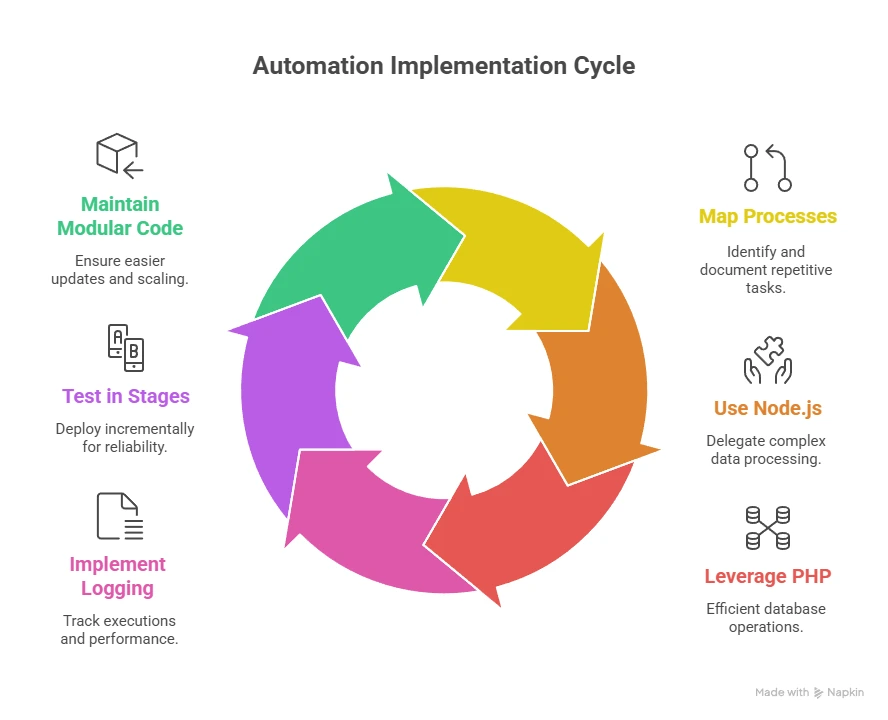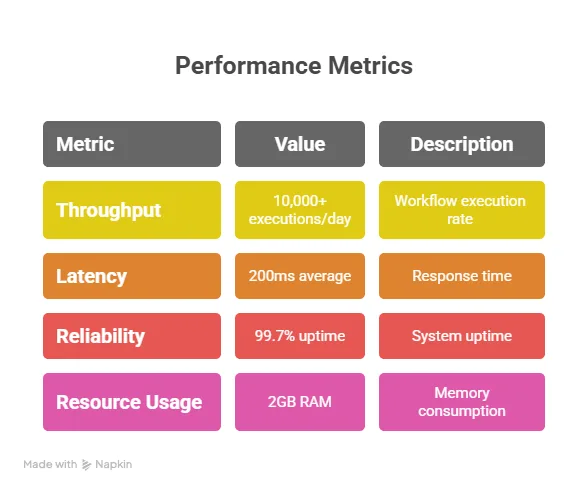In today’s fast-paced digital environment, businesses are continually seeking solutions to streamline workflows, reduce repetitive tasks, and scale operations efficiently. As developers and technology enthusiasts, we often face the challenge of integrating diverse systems, automating repetitive processes, and building robust solutions that scale without exponential complexity. Through our experience, we discovered that combining N8N, Node.js, and PHP 8.2 offers a powerful approach to achieve intelligent automation at scale.
In this blog, I will share insights, practical applications, and technical perspectives on how this tech stack can transform operations while enhancing productivity.

Understanding N8N: The Heart of Workflow Automation
N8N is an open-source workflow automation tool that allows you to connect multiple applications and services without writing extensive custom code. Unlike other automation platforms, N8N provides a highly flexible, self-hosted environment where you have full control over your workflows, data privacy, and execution logic.
From our experience:
-
Ease of Integration: N8N provides built-in connectors for hundreds of services, including CRMs, databases, APIs, and cloud storage. For organizations using multiple tools, this eliminates the complexity of custom integration.
-
Custom Nodes with Node.js: Whenever default nodes don’t meet your requirements, we can write custom nodes using Node.js. This flexibility allows us to create highly tailored workflows.
-
Trigger Mechanisms: N8N workflows can be triggered via webhooks, schedules, or events, providing dynamic automation capabilities.
-
Scalability: N8N can handle complex workflows with multiple conditional branches, API calls, and data transformations without slowing down the system.
By leveraging N8N, we’ve been able to reduce manual intervention in repetitive tasks, from synchronizing customer data between systems to automating invoice processing.
Node.js: Building the Engine for Real-Time Automation
While N8N provides the orchestration layer, Node.js serves as the backbone for custom logic and real-time processing. Node.js is a JavaScript runtime known for its non-blocking, event-driven architecture, making it perfect for handling multiple simultaneous operations.
Our practical experiences with Node.js in automation include:
-
Custom API Integration: We built Node.js microservices that interact with internal APIs and feed data into N8N workflows. This ensures that even legacy systems without direct N8N support can be automated efficiently.
-
Data Transformation: Before sending data to downstream systems, Node.js allows us to transform, validate, and enrich information. For example, we automated lead enrichment by fetching data from public APIs and normalizing it.
-
Error Handling and Logging: Node.js provides robust error-handling mechanisms. By integrating logging frameworks like Winston and monitoring tools like PM2, we ensure that every workflow execution is traceable and recoverable.
-
Scalable Event Processing: For workflows triggered by high-volume events, Node.js can process data streams efficiently, making automation reliable even at scale.
Combining N8N with Node.js ensures that automation is not only flexible but also capable of handling high-load scenarios without downtime.
PHP 8.2: Modernizing Backend Automation
PHP has been traditionally associated with web development, but PHP 8.2 introduces significant performance and syntax improvements that make it a reliable choice for backend automation:
-
Attributes and Enums: PHP 8.2 allows us to use attributes and enums to define workflow metadata or configuration parameters cleanly.
-
Readonly Classes: This feature ensures that certain classes, particularly configuration objects or constants, remain immutable, reducing unexpected bugs.
-
Performance Improvements: PHP 8.2 offers faster execution times, which is critical when handling API requests or running scheduled jobs.
-
Seamless Integration with Databases: PHP’s mature ecosystem for database interaction ensures reliable automation for tasks such as batch updates, reporting, and email campaigns.
In our experience, PHP 8.2 complements Node.js and N8N by handling backend processes that involve complex database operations, email automation, or system reporting.
The Architecture
N8N handles workflow orchestration – connecting services, managing triggers, and routing data between systems.
Node.js processes complex logic, handles real-time events, and manages API integrations that require custom business rules.
PHP 8.2 executes database-heavy operations, generates reports, and handles backend processes that benefit from PHP’s mature ecosystem.
Real Implementation Examples
CRM Data Synchronization
We automated lead synchronization between Salesforce and HubSpot:
- N8N triggers on new Salesforce leads
- Node.js validates and enriches data using external APIs
- PHP script performs bulk database updates and generates audit logs
- Result: 95% reduction in manual data entry errors
Invoice Processing Pipeline
Automated invoice generation for a SaaS company:
- N8N monitors subscription changes via webhook
- Node.js calculates prorated amounts and applies business rules
- PHP generates PDF invoices and updates accounting database
- Performance: Processes 500+ invoices/hour vs. 50/hour manually
IT Monitoring System
Built automated incident response:
- Node.js scripts collect metrics from multiple servers
- N8N evaluates thresholds and routing rules
- PHP logs incidents and generates status reports
- Outcome: 40% faster incident response time
Why This Combination is Optimal for Intelligent Automation
-
Flexibility: Each component of this stack addresses different aspects of automation. N8N orchestrates, Node.js processes, and PHP 8.2 executes backend tasks.
-
Scalability: Node.js’ asynchronous processing and N8N’s workflow design ensure workflows scale efficiently.
-
Maintainability: By separating orchestration, logic, and backend tasks, our automation setup remains modular and easy to maintain.
-
Cost-Effectiveness: Using open-source tools reduces licensing costs while giving complete control over automation.
-
Security: Self-hosted N8N and PHP 8.2’s secure coding practices ensure sensitive data stays protected.
We found that enterprises with complex processes benefited from this approach, as it enabled them to reduce operational costs and scale without additional headcount.
Best Practices for Implementing Automation

From our hands-on experience, here are some key recommendations:
-
Start with Mapping Processes: Identify repetitive tasks and system interactions. Document workflows before automating.
-
Use Node.js for Complex Logic: Avoid overloading N8N with heavy computations. Delegate data processing to Node.js services.
-
Leverage PHP 8.2 for Database Operations: For batch updates, reporting, and backend-specific tasks, PHP remains efficient and reliable.
-
Implement Logging and Monitoring: Track workflow executions, errors, and performance metrics to ensure stability.
-
Test in Stages: Deploy workflows incrementally. Start with low-risk tasks to ensure system reliability.
-
Maintain Modular Code: Keep Node.js services and PHP scripts modular for easier updates and scaling.
By following these practices, we ensure sustainable automation that grows with business needs.
Implementation Challenges
Workflow Complexity
Problem: Managing 200+ interconnected workflows becomes unwieldy Solution: Implemented naming conventions, version control, and workflow documentation standards
API Rate Limiting
Problem: High-volume automation hitting third-party API limits Solution: Built queue management in Node.js with exponential backoff and request batching
Error Handling
Problem: Failed workflows causing data inconsistencies Solution: Designed retry mechanisms, dead letter queues, and manual intervention alerts
Performance Metrics

From our production deployments:
- Throughput: 10,000+ workflow executions/day on standard hardware
- Latency: Average 200ms response time for webhook-triggered workflows
- Reliability: 99.7% uptime with proper error handling
- Resource Usage: 2GB RAM handles most enterprise workloads
Key Takeaways
-
N8N is the orchestrator, simplifying connections between applications.
-
Node.js is the processor, enabling high-performance and scalable logic execution.
-
PHP 8.2 is the backend powerhouse, handling database-intensive tasks efficiently.
-
Together, they enable intelligent automation at scale, reducing manual labor, improving accuracy, and enhancing operational efficiency.
Our experience has demonstrated that businesses embracing this stack achieve tangible ROI, faster workflows, and a modernized digital infrastructure.
FAQs
1. What is N8N and how is it different from Zapier or Integromat?
N8N is an open-source workflow automation tool that allows self-hosting, giving complete control over workflows and data privacy. Unlike Zapier, it’s fully extensible using Node.js and doesn’t rely on third-party cloud services.
2. Can Node.js handle high-volume automation tasks?
Yes, Node.js is built for asynchronous, non-blocking operations, making it ideal for processing large amounts of data in real-time without blocking workflow execution.
3. Why use PHP 8.2 in modern automation?
PHP 8.2 offers improved performance, modern syntax (enums, readonly classes), and seamless database integration, making it suitable for backend processing, reporting, and batch operations.
4. How secure is N8N for enterprise automation?
Self-hosted N8N allows you to control access, data encryption, and network security. Combined with Node.js and PHP best practices, the stack can meet enterprise-grade security standards.
5. Is this automation stack scalable for global enterprises?
Absolutely. N8N handles orchestration, Node.js manages high-volume processing, and PHP 8.2 efficiently executes backend operations, enabling automation to scale horizontally across multiple systems and regions.
Resource Center
These aren’t just blogs – they’re bite-sized strategies for navigating a fast-moving business world. So pour yourself a cup, settle in, and discover insights that could shape your next big move.
What Industries Benefit the Most from AI Development Services?
Top Industries Transforming with AI Development Services Artificial Intelligence is no longer an experimental technology reserved for research labs. It has become a strategic growth engine across global markets. [...]
Should You Hire an In-House or Remote .NET Developer?
In today’s competitive digital ecosystem, the success of your software product often depends on one critical decision — how you hire your .NET developer. Whether you are building enterprise [...]
How Much Does It Cost to Build a Generative AI Solution?
Generative AI is no longer an experimental technology—it is a business accelerator. From AI-powered chatbots and intelligent document automation to custom large language model (LLM) integrations and AI copilots, [...]

